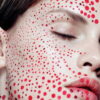On the correction of a gummy smile, mimic wrinkles, and age-related changes in the lower third of the face and neck, as well as combined techniques for the use of botulinum toxin type A.
On the correction of mimic wrinkles and age-related changes in the upper third of the face (forehead, glabella, eyebrows, eyes, nose) using botulinum toxin type A.
Allergan Announces Results of Higher Dose BOTOX® Cosmetic (onabotulinumtoxin A) for the Treatment of Moderate to Severe Glabellar Lines.
Who chooses botulinum toxin type A — Xeomin? Who can it be recommended for? Features of correction in different areas of the face and neck. Injection technique guidance and possible adverse effects.
Mesotherapy is a method of administering medications intradermally in very low doses, to achieve both a pharmacological effect and a physical stimulation effect.
Modern aesthetic medicine offers two identical products for eliminating expression lines — Botox and Dysport. But how do they differ? And which one should you choose?
Many people have noticed that lately the effect of Botox has become shorter. Previously, the results lasted about six months, but now only around three. Is it tolerance? Are cosmetologists diluting the product more? Has the composition of the drug changed?
Today, the professional market offers an entire family of botulinum toxin–containing drugs, but they are not “twins” and have different safety and efficacy profiles, as well as differences related to production, composition, and application protocols.
Advertising for contouring procedures paints an appealing picture of the expected result, while specialists during consultations often remain silent about the possibility of complications. As a result, any deviation from the desired ideal becomes an unpleasant surprise for patients.
Until recently, plastic surgery was based on a simple principle: signs of aging were eliminated by excising skin, fat, fascia, and muscle tissue, followed by tightening of the remaining tissues. But what about now? What changes have occurred in the approach to rejuvenation?






